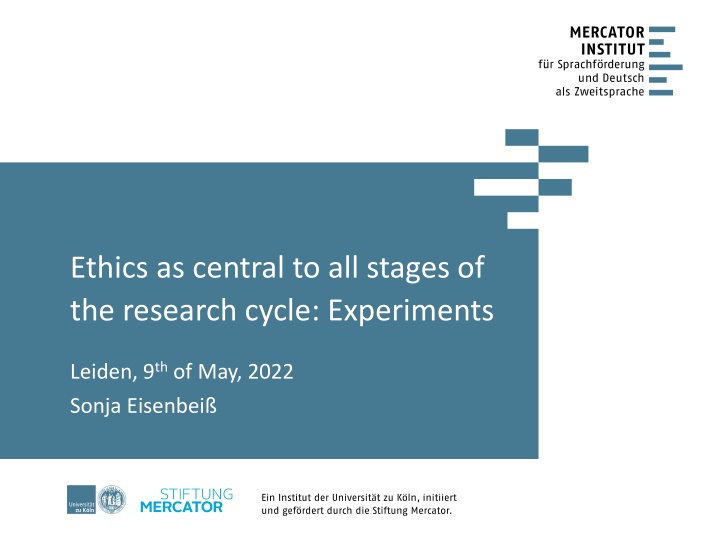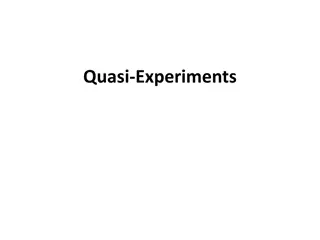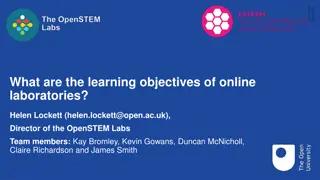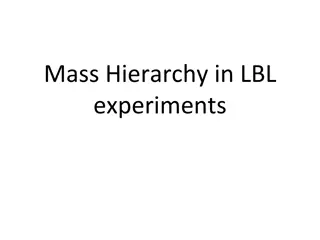
Ethical Considerations in Research: Experiments Leiden 2022
Ethics play a central role in all stages of the research cycle, as discussed in the Experiments Leiden event in May 2022. The presentation by Sonja Eisenbei highlights the importance of ethical principles, properties of experiments, and classifying ethical issues. Various perspectives, including research participants, society, and communities, are explored, emphasizing the need for integrity, transparency, and respect throughout the research process. Key principles such as data quality, participant well-being, and societal impact are crucial in ensuring ethical conduct in research.
Uploaded on | 2 Views
Download Presentation

Please find below an Image/Link to download the presentation.
The content on the website is provided AS IS for your information and personal use only. It may not be sold, licensed, or shared on other websites without obtaining consent from the author. If you encounter any issues during the download, it is possible that the publisher has removed the file from their server.
You are allowed to download the files provided on this website for personal or commercial use, subject to the condition that they are used lawfully. All files are the property of their respective owners.
The content on the website is provided AS IS for your information and personal use only. It may not be sold, licensed, or shared on other websites without obtaining consent from the author.
E N D
Presentation Transcript
Ethics as central to all stages of the research cycle: Experiments Leiden, 9thof May, 2022 Sonja Eisenbei
Overview Classifying ethical principles Properties of experiments 10 ethical issues related to experiments Summary Ethics - Experiments 2
Classifying Ethical Principles: Perspectives 1. 2. 3. Research Participants Society and Communities Links and Readings: Ethics webpages and blogs: https://experimentalfieldlinguistics.wordpress.com/links/linksethics/ Ethics readings: https://experimentalfieldlinguistics.wordpress.com/ethics-readings/ Open Science: https://experimentalfieldlinguistics.wordpress.com/open-science/ Ethics - Experiments 4
1. Research a. Data quality and scientific value b. Record preservation c. Open Data d. Open Access e. Transparency of research processes f. Independence of research Ethics - Experiments 5
2. Participants a. Doing no harm b. Benefits for individuals c. Confidentiality and anonymity d. Trust, honesty, and avoiding deception e. Dignity and respect f. Freedom from coercion g. Informed consent h. Appropriate compensation i. Acknowledgement of contributions j. Fairness and justice Ethics - Experiments 6
3. Society and Communities a. Respect for community rights (e.g. rights to a language) b. No negative impacts on communities c. Benefits for communities d. Sustainability of resulting community resources e. Minimal negative environmental impact f. Fairness and justice Ethics - Experiments 7
Classifying Ethical Issues: Permaculture Permaculture: creating sustainable systems based on insights from natural systems, in agriculture, gardens, and society Permaculture information and resources: https://www.sprache-spiel-natur.de/tag/permakultur-einfuehrung/ Permaculture Ethics: Earth Care People Care Fair Share Ethics - Experiments 8
Properties of Experiments Systematic manipulation and control of variables, stimuli, and procedures High reliability High comparability in cross-linguistic/cultural studies Opportunity to obtain negative evidence (e.g. in judgment tasks) Artificially created experimental situations High demands on participants Low ecological validity Ethics - Experiments 10
Ethical Issues Related to Experiments 11
10 Ethical Issues Related to Experiments 1. Lack of familiarity with the concept of experimentation 2. Information about the experimental design 3. Demands of experimental methods 4. Data types 5. Accidental findings 6. Interdisciplinarity 7. Power and knowledge imbalances 8. The indirect nature of community benefits 9. Sustainability of data and resource management 10. Ecological impact Ethics - Experiments 12
1. Lack of Familiarity with the Concept of Experimentation 1a. Data quality and scientific value 2d./g Trust, honesty, and avoiding deception; informed consent How do we ensure that participants are sufficiently familiar with the concept of experimentation so that they understand what they will be asked to do? How do we avoid compromising data quality by participants not following experimental procedures as they fail to understand the concept of experimentation? Offering information about the concept of experimentation, especially in fieldwork projects Ethics - Experiments 13
2. Information about the Experimental Design 1a. Data quality and scientific value 2d./g Trust, honesty, and avoiding deception; informed consent How much information about the rationale and design of the respective experiment do we need to provide before participants can give informed consent? How can we debrief participants afterwards, in particular if they are nomadic or do not have access to the internet? How do we ensure that (de)briefing and information sharing between participants does not lead to response strategies? Pre-Experiment: specific information about tasks and demands, but more general information about aims and design Online or "live" debriefing after all data has been collected Ethics - Experiments 14
3. Demands of Experimental Methods 1a. Data quality and scientific value 2a. Doing no harm How do we minimize the demands of some experimental methods (e.g. judgment tasks, neurolinguistic tasks), in particular on children? How do we avoid the pressure to answer "correctly"? Which changes in tasks improve or reduce quality? More research on task demands More research on effects of gamification on task demands and data quality Ethics - Experiments 15
4. Data Types 1a-e. Data quality and scientific value; record preservation; Open Data; Open Access; transparency of research processes 2c. Confidentiality and anonymity Increasingly detailed personal information in small-scale experimental studies prevents effective anonymization (e.g. language use questionnaires, Anderson et al., 2018 , Q-Bex)? Assistant obtain access to sensitive (psychometric) data. Ethics training of research assistants Open Access to aggregated data Restriction of access to non-aggregated data sets Exluding particular identifying variables from questionnaires Ethics - Experiments 16
5. Accidental (Inadvertent) Findings 1a. Doing no harm 2a. Benefits for individuals 2g. Informed consent Experiments or accompanying stadnardized tests can reveal cognitive deficits or medical issues (e.g. low IQ, reading difficulties, brain tumors or lesions). In which cases and how should we inform participants? Which professionals should be included? Development of more detailled guidelines (e.g.Stip et al. 2019) Inclusion of information about procedures in consent forms Ethics - Experiments 17
6. Interdisciplinarity 1a. Resarch Quality 1b. Record Preservation 2c. Confidentiality and anonymity How many participant are needed (e.g. sociology vs. linguistics)? Some disciplines focus on data protection and aim for deletion of data samples (e.g. medicine), while others try to preserve records (e.g. anthropology or language documentation). Power analyses as standard for quantitative studies Record preservation in data archives with a range of levels for access (free access to access only for original project and collaborators) Ethics - Experiments 18
7. Power and Knowledge Imbalances 1a. Data quality and scientific value 3f. Fairness and justice at the society or commuity level Research institutions in WEIRD countries tend to have more expertise in experimental research and better lab-funding, leading to power and knowledge imbalances in collaborations. Bidirectional research training, e.g. experimental method and statistics training vs. fieldwork methods training ad information about the local language and environmet (Rice 2011, Jukes2011) Teaching exchange programmes Joint supervision of students Ethics - Experiments 19
8. The indirect nature of community benefits 3c. Benefits for communities Naturalistic recordings are immediately usable by communities (preservation of heritage, language teaching). This is typically not the case for experimental data (reaction- times, judgments, eye-movement-measurements). Community involvement in design of video or audio stimuli for experiments so that they can later be employed in teaching or capture local life for documentation projects Creation of databases with experimental data that support lexicon development (see 9.) Ethics - Experiments 20
9. Sustainability of data and resource management 1b.-e. Record preservation, Open Data; Open Access; transparency of research processes 3c. Sustainability of resulting community resources In contrast to corpus data, experimental data is typically only used for one or a few studies. Creation of cross-linguistic databases for experimental data sets that were collected to be reanalyzed by future projects (e.g. lexical databases with lexical decision or naming) Experimental studies that are designed with a dual purpose: (i) answering immediate research questions and (ii) as pilot studies for language assessment tools (e.g. BISLI/Litmus) Guidelines for sustainable digital systems (see reading list) Ethics - Experiments 21
10. Environmental Impact 3e. Minimal negative environmental impact Experimental studies typically involve: a lot of travel (often as many trips for a few experiments as for an entire documentation/corpus) single-use (plastic/laminated) stimulus materials high-tech equipment that gets outdated quickly webhosting and streaming for online experiments Guidelines for sustainable travel Reusable toolkits for stimulus creation (e.g. "language in a bag") Better equipment sharing and re-use after end of project Green webhosting for data and project webpages Training in energy-efficient use of equipment, mail etc. Ethics - Experiments 22
Summary 23
10 Ethical Issues Related to Experiments 1. Lack of familiarity with the concept of experimentation 2. Information about the experimental design 3. Demands of experimental methods 4. Data types 5. Accidental findings 6. Interdisciplinarity 7. Power and knowledge imbalances 8. The indirect nature of community benefits 9. Sustainability of data and resource management 10. Ecological impact Ethics - Experiments 24
Thank you! and all participants, collaborators, administrators, and funders Documenting child language: The Qaqet of Papua New Guinea SFB 1252 "Prominence in Language Ethics - Experiments 25






















